JWF Fund 2018
Japan Water Form (JWF) Fund was established in 2005 to support organizations aiming at solving water-related issues at a grass-roots level. It is formed and operated by utilizing membership fees of JWF and donations through JWF’s “Charity for Water”.
The JWF Fund 2018 was conducted as described below where 7 projects from 5 countries were selected out of 408 projects submitted from 41 countries.
Out line of calling for the JWF Fund 2018
・Application Period: 1 June to 31 July 2018
・Eligible 86 countries: The Least Developed Countries, Other Low-income Countries and Lower Middle-income Countries/Territories listed in the “DAC List of ODA Recipients Effective for reporting on 2018, 2019 and 2020 flows” defined by the OECD.
・Number of the Applications: 408 projects from 41 countries
・Selected projects: 7 projects from 5 countries; Sierra Leone (1), Laos (1), Malawi (2), Uganda (2), and DR DCongo (1)
Report
JWF Fund 2018 Implementation Report (PDF)
Recipients and outlines of the JWF Fund 2018
1. Good Sanitation Facility is Life (Construction of 2 Pit Latrines and Good hygiene practice education in 2 Schools (Sierra Leone)
Outlines of the ptroject
・Organization: Economic Empowerment and Human Rights Sierra Leone (EEHRSL (#130)
・Project title: Good Sanitation Facility is Life (Construction of 2 Pit Latrines and Good hygiene practice education in 2 Schools (Sierra Leone)
・Country/Area: Bombari, Kerene district, Sierra Leone
・Project period: October 2018 to March 2019
・Number of beneficiaries: 582 (568 children and students, 14 teachers)
・Cost: $2,154 ($1,000: JWF funds, $300: beneficiaries, and $854: EEHRSL).
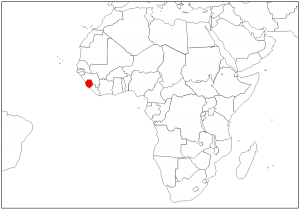 |
| Sierra Leone |
Background
Lack of sanitation facility and hygiene education are big problems in schools of rural communities in Sierra Leone. There are no latrines in 2 targeting primary schools and these primary schools have the population of 568 pupils. The pupils defecated behind their school, whereby domestic animals such as dogs, ducks and fowls feed on this defecation. Girls are unwilling to defecate in open places, therefore they do not want to go to school. It makes many girls dropped out of school.
According to the EEHRSL Resent research conducted and District Health Management Team’s estimations, about 1/7 of the population in Sierra Leone still openly defecates in the absence of any toilet/latrine, of which 75% lives in deprived rural communities. Fecal pollution is a real issue since polluted drinking water causes water borne diseases such as viral gastroenteritis, viral hepatitis, typhoid, cholera epidemics, diarrhea and so on. As a result, primary school pupils and people in the communities are exposed to those water-borne diseases.
Outputs
1) Hold meetings with local stakeholders
2) Construction of two VIP toilets*1 and the installation of two hand washing facilities
3) Two training sessions on good hygiene practices
4) Three health campaigns
5) Hold two meetings on maintenance and management of construction facilities
*1 : VIP (Ventilated Improved Pit toilet is a sanitary facility equipped with ventilation pipes to prevent odors and flies from occurring.
Voices from the beneficiaries
- Alusine Bangura (27 years old, school principal)
The school is surrounded by dense bush and operated by the community. There is no support from the government or other organizations. Parents’ economic status is very poor and it was difficult to get the cost of constructing schools and toilets, so I am very happy that the toilets were constructed by the EEHRSL.
When construction work began, the principals of other schools asked EEHRSL to help them build toilets, wells, and repair schools. Previously, we used the old toilets in their neighboring houses which are dangerous to our safety and also used the nearby bush for defecation due to urgency and pressure. By these practices, our cloths get dirty and we could not pray. We could not get water for taking bath and making ablution. Now I don’t have to use a dilapidated latrine and also my student can use decent latrine. - Mr. Alimamy S.Kamara (12 years old, elementary school children)
First of all, I want to appreciate the Japan water Forum for the fund, we have lot of dangerous animals in the bush where we did open defecation. Earlier, we had to go out for open defecation and we got attacked by animals and diseases. Now we do not go for open defecation and we are now free from many diseases.
Our parents had earlier spent money for our medication to see doctors, now they don’t. We are now using our own latrine and hand wash facility which is good. - Ms. Sento Kamara (16 years old, school children)
In our school there was no latrine. We used to rush to bush at the back of our school every day. While rushing for open defecation, we could not consider who was in front of us because defecation is more urgent than anything else. Many times I used to cry for such a shameful and embarrassing situation.
Now this problem has gone as we have a very decent VIP latrine. By getting a latrine I am so happy that I have been transferred from hell to heaven and the problem girls faced with menstrual cycle is now over. Thanks to Economic Empowerment and Human Rights Sierra Leone for providing this facility for our School, through the Japan Water Forum, more especially the hygiene education training.
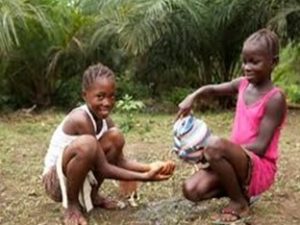 |
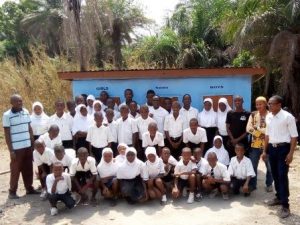 |
| Be excreted outdoors on the school premises | Completed VIP toilets and students |
2.Water supply improvement in rural village of Ban Paen, Phoukout District, Xiengkhouang Province, Laos (Laos)
Outline of the project
・Organizations: Ban Paen Environmental Protection and Development Group (#133)
・Project title: Water supply improvement in rural village of Ban Paen, Phoukout District, Xiengkhouang Province, Laos
・Country/Area: Lao People’s Democratic Republic/ Xiengkhouang Province
・Project period: October 2018 to February 2019
・Number of beneficiaries: 189 (65 women, 50 men, 74 children)
・Cost: $4,000 ($1,000: JWF funds, $1,500: beneficiaries, and $1,500: BPE)
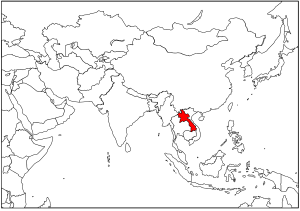 |
| Laos |
Background
Ban Paen Village comprises of 125 households and has over 600 residents. The village is relatively dry and water shortage has become norm. To solve the water issue, 3 small water pipeline projects for the village have been developed with funding from the USAID and UNDP in 2010.
However, because of climate change, water flow through the pipelines decreases while population in the village rising. In addition, a pipeline was broken and some parts were deliberately destroyed by someone villagers have never known.
As result, a large portion of the village and its primary school have been struggling for water since 2015. Today, even during the monsoon season, there is very little or no water runs through the pipeline. The water shortage has affected everybody in the village, and even little girls must fetch the water from well far away from their families. Worst of all, school kids must bring water from home for washing and cleaning of their toilets at school.
Outputs
1) Expansion and upgrade of one existing catchment.
2) A new small catchment was constructed.
3) An existing pipeline was totally repaired and embedded.
4) The village primary school has gained an access to water supply.
5) Establishment of new rules for water management and water supply.
Voices from the beneficiaries
- Phomma Dalasaeng (70 years old)
Thanks to the JWF because we do not only have enough water for consumption but also gardening and animals. - Seangphone Lattana (59 years old)
Because of the very project, I no longer need to fetch water from well for cooking and washing. - Khamvixay Sounisonh (36 years old)
I now not only have enough water for consumption but also my catfish aquiculture as well. Thanks to JWF, I don’t need to buy catfish for my family and little kitten from now on.
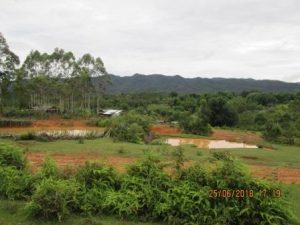 |
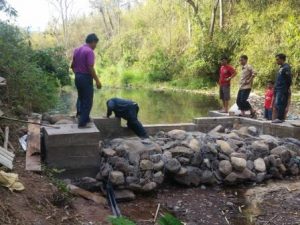 |
| Reservoir used as a water source | Construction of new small-scale reservoirs |
3.Maleule Boreholes Repair Project (Malawi)
Outline of the project
・Organization: Centre for Climate Change and Environment Management (CCCEM (#172)
・Project title: Maleule Boreholes Repair Project
・Countries/Area: Malawi/Blantyre District
・Project period: October 2018 to February 2019
・Number of beneficiaries: 1,350 (350 women, 300 men, 700 children)
・Cost: $1,543 ($996: JWF funds, $249: beneficiaries, and $298: CCCEM)
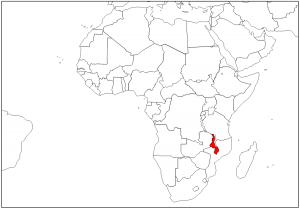 |
| Malawi |
Background
In the Maleule community, there are five shared boreholes but three out of five are in our operation. When the rids were removed to investigate the status, it was because of lowering water table during the dry season, under influence by climate change. Over 2000 residents thus use the only functioning two shared boreholes, spending their valued time on the queue. People from Chinyonga Village, however, walk a distance of more than five kilometers to draw safe water, as they resigned to stand in a long queue.
Outputs
1) Mobilization of local residents
2) Repair of two existing wells
3) Repair of drainage ditches of wells and surrounding facilities and laundry facilities
4) Establishment of a well management committee
5) Training on maintenance and management
6) Training on water, sanitation and financing
7) Water quality test
Voices from the beneficiaries
- Jofrey Chopi (37 years old)
Chinyonga Chief is appreciating the support that JWF and CCCEM did to his community in solving the portable water challenge they have been facing for years. Together with his people they promised to care the boreholes and other structures to stay longer. He added that what you did to us should be done to others who are facing the same problem, God bless you. - Etta Makwiti (53 years old)
She serves as the chair of the boreholes management committee. She is overwhelmed with your heartfelt support to the rural people who are lacking portable water, who are spending much of their time fetching water than doing other economic activities. She witnessed that now she can spend only two hours drawing water and the other hours doing small business at a nearest primary school, selling groundnuts and cassava. - Femia Macheza (42 years old)
She is a Village Development Committee chair in this community. She just said one strong sentence that you could have been staying in town enjoying piped water and doing your own business to make yourself wealth but you thought over us here in remote area that are an able to access portable water at short distances, God bless you for your kindness.
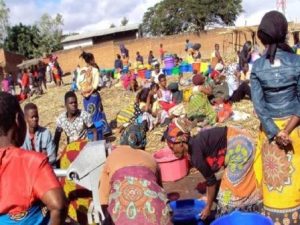 |
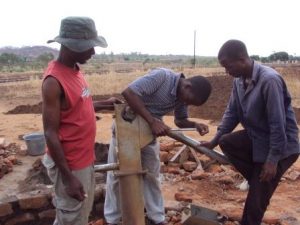 |
| Residents gathering at existing wells to collect water | Repair of wells |
4.Construction of water well at Palankhwali area (Malawi)
The project completion report was not submitted by Friends of Compassion.
Outline of the project
・Organization: Friends of Compassion (Fricom) (#372)
・Project title: Construction of water well at Palankhwali area
・Countries/Area: Malawi / Dowa District
・Project period: October 2018 to February 2019 (planned)
・Number of beneficiaries: 1,051 (288 women, 353 men, 410 children) (planned)
・Cost: $2,950.3 ($1,000: JWF funds, $710: beneficiaries, and $1,240.3: Fircom) (planned)
 |
| Malawi |
Background
The water problems of the Mpindang’ombe village and the Kawolamwazi village in the Palankhwali area are long distance to access water resources and lack of permanent water resource facility in the community.
People in the villages fetch water from a pond 1.5 km away from the villages and they use the water for drinking, cooking, washing and bathing every day. Sometimes they drink the water without boiling during dry season.
This situation has brought grave consequences in Socio-economic and health components of the population. Health impact includes the case where some adults and children who use water from the pond for drinking purpose are getting sick. This represents annually 25 % of water related diseases among the population of the area, costing about 15% of annual household budget for medical treatment of their family members.
Socio-economic impact is that women and children are spending about 2.5 hours per day to fetch water from long distance. This negatively impacts children’s attendance in school.
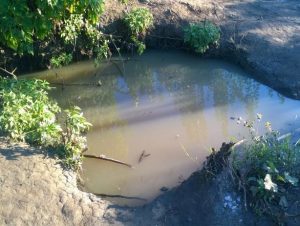 |
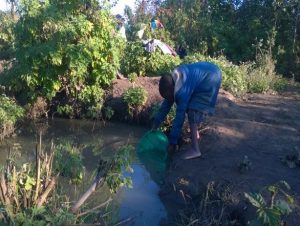 |
| Pond used as a water source | Children drawing water from the pond |
5.Construction and protection of Kiwanyi community spring and massive community sensitization on water and sanitation (Uganda)
Outline of the project
・Organization: Kiwanyi Health Centre-Group (#029)
・Project title: Construction and protection of Kiwanyi community spring and massive community sensitization on water and sanitation
・Countries/Area: Uganda/Iganga DIstrict
・Project period: October 2018 to February 2019
・Number of beneficiaries: 3,400 (1,200 women, 500 men, 1,700 children)
・Cost: $1,400 ($790: JWF funds, $23: beneficiaries, and $380: KHC)
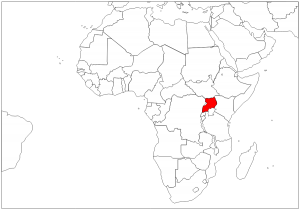 |
| Uganda |
Background
The people in Kiwanyi Village fetch water from the spring located outside of the village and use it for drinking and other domestic purposes. However, the water resource is unsafe because it is not protected and easy to be contaminated.
When the project team visited the village in April 2018, some sanitation facilities such as latrines, bath shelters and refuse pit were there and used by the village people, excepting hand washing devices in the community.
The Kiwanyi Health Centre’s data shows that one in 6 people experiences diarrhea or skin infection daily, and that one in 26 people also has eye infection in the target village.
Outputs
1) Community dialogue meetings with various stakeholders
2) Establishment of project execution management team
3) Construction and conservation of one water spring
4) Six awareness and educational activities on water and sanitation
5) Two-day training on water-borne disease prevention and good sanitation practices at home and school
6) Establishment of a water users committee comprising of 8 members
7) Water quality test
Voices from the beneficiaries
- Babirye Aisha (29 years old)
We are grateful for the support provided by the Japan Water Forum to local spring water protection equipment. - Nangobi Masitulla (14 years old)
Thank you KHC for relieving us from unclean water and going far to find safe water. - Isabirye Peter (48 years old)
Thank you for this support. My family became safe from diarrheal diseases. Give God’s blessing to everyone who has been involved in the project’s success.
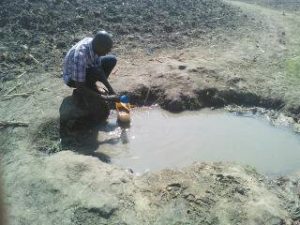 |
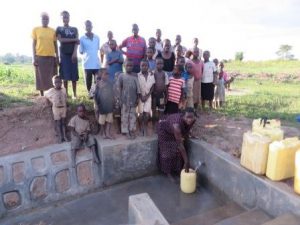 |
| Pond used by residents as a water source | Completed spring water protection equipment and residents |
6.Maintenance of spring wells, awareness on hygiene and training of village women water users in Padolo parish (Uganda)
Outline of the project
・Organization: Community Uplift and Welfare Development (CUWEDE) (#053)
・Project title: Maintenance of spring wells, awareness on hygiene and training of village women water users in Padolo parish
・Countries/Area: Uganda/Nebbi District
・Project period: October 2018 to March 2019
・Number of beneficiaries: 1,735 (625 women, 960 men, 150 children)
・Cost: $1,985 ($1,000: JWF funds, $400: beneficiaries, and $585: CUWEDE)
 |
| Uganda |
Background
People living in the Central village and the Oryang village use spring wells in Arimo and Amelenju-Avubu as water source for drinking, cooking, washing, and other domestic uses. However, the facilities are dilapidated, muddy and rusty. In addition to that, poor water handling and maintenance by the users have caused increasing risks of possible water diseases and other diseases such as malaria since such areas could be breeding ground for mosquitos.
For the last four years, these two target villages have recorded the highest number of cases of water borne diseases including especially dysentery, typhoid, hepatitis B, diarrhea, amoebiosis and cholera.
Outputs
1) Repair of two existing spring wells.
2) Conducted awareness-raising meetings for equipment users four times
3) Two-day training for village women water users
4) Water quality test by Assistant District Water officer
5) Eight monitoring visits during the project periods
Voices from the beneficiaries
- Opio Odongo (42 years old)
Our water points have become clean and healthy, and the construction has been durable and we are now happy that we can have clean water for at least 30 years which our grandchildren will as well benefit from. Thanks CUWEDE and JWF for helping us. - Akumu Okwerjok (36 years ols)
I have lived in this area for 42 years and know Arimo spring well as producer of Odour, bad smell and dusty water. We had no option but to continue taking it. I feel very happy that CUWEDE and JWF proved to us that. Arimo can become better and healthy in this form. I will do whatever I can do to ensure that nobody hampers the water and hygiene in this place. and we will execute heavy punishment on anyone who will not comply. Now the water is very sweet, very cold and I enjoy taking it all the time. - Agnes Ochan (34 years old)
I enjoyed the training delivered to us on water maintenance and hygiene management. I now understand that we have not done a lot in securing the right hygiene and have been responsible for poor hygiene both at the water points and at home. Now I ensure my containers are pretty clean, and are committed to teach my fellow women and children to be change agents in promoting clean hygiene. This will help us avoid catching unnecessary diseases and indeed we shall remain healthy forever.
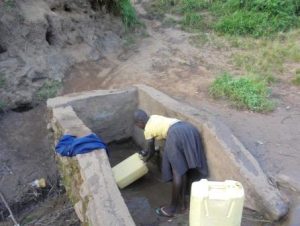 |
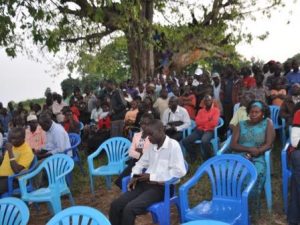 |
| Water supply system in Amelenju-Avubu | Awareness-raising activities for equipment users |
7.Latrine sauveuse des vies au marché de NGUMA (Democratic Republic of the Congo)
Outline of the project
・Organization: Congrjsde Jeunes pour la Paix et le Dévelopement (COJEPAD) (#233)
・Project title: Latrine sauveuse des vies au marché de NGUMA
・Countries/Area: Democratic Republic of the Congo/South Kivu Province
・Project period: October 2018 to February 2019
・Number of beneficiaries: 316 (120 women, 111 men, 85 children)
・Cost: $1,497 ($1,000: JWF funds, $150: beneficiaries, and $347: COJEPAD)
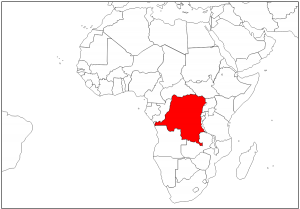 |
| Democratic Republic of the Congo |
Background
NGUMA’s twice-weekly market is the only place to supply staples to local people and surrounding villages. The sellers and users of this market suffer from lack of sanitation facilities like latrine. They defecate in the bush without facilities for washing hands. This unruly defecation practice contaminates not only surface of the soil and groundwater, but also goods in the market.
According to the annual report of the Central Office of the Fizi Health Zone 2016, NGUMA is one of the villages where high rate of waterborne diseases has been reported. 49% of the households were affected by outbreak of cholera and the percentage rose to 100% if including other waterborne diseases. 17 people died due to such diseases. Men, women and children from surrounding villages who frequent this market have also been affected.
Outputs
1) Holding meetings involving local stakeholders.
2) Construction of two pit latrines*2.
3) Construction of two hand washing stations.
4) Establishment of the Operation and Maintenance Committee.
5) One training session on hand washing and maintenance.
6) Cleaning of the places where people used for open defecation.
*2: Pit latrine: Easy-to-drop toilet.
Voices from the beneficiaries
- IDDI MKONGO wa Thomas (82 years old)
Long live COJEPAD and JWF for their insight into the deep problems of our community including the one affecting our health. God bless you. - MWANGAZA DJUMA (41 years old)
Thanks to your sensitization, I realize that we sold goods together with diseases. I will now practice your teachings. Would you continue to give us these kinds of messages? - IKYENGELO MUNGAL (32 years old)
In a remote area like ours where the actions of NGOs as well as those of the government are almost non-existent, I can only wish long life to COJEPAD and JWF who understood the pain felt by the villagers of NGUMA in particular and those of all users of its market. We have other hygiene and sanitation challenges that we face every day. You should also take a closer look.
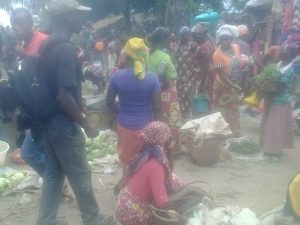 |
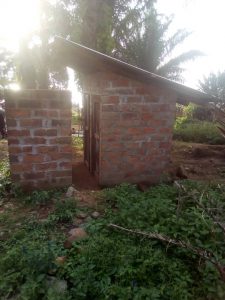 |
| NGUMA market | Finished pit latrine |
(Reported by Sae Ishihara, Manager and Akie Gunji, Assistant Manager)
